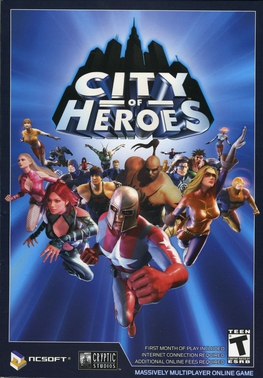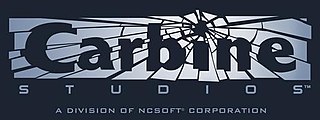A massively multiplayer online game is an online video game with a large number of players to interact in the same online game world. MMOs usually feature a huge, persistent open world, although there are games that differ. These games can be found for most network-capable platforms, including the personal computer, video game console, or smartphones and other mobile devices.

NCSoft Corporation is a South Korean video game developer and publisher headquartered in Pangyo, Seongnam, South Korea, primarily known for the distribution of massively multiplayer online role-playing games such as Lineage and Guild Wars.

City of Heroes (CoH) is a massively multiplayer online role-playing game originally created by Cryptic Studios prior to the IP’s acquisition by NCSoft. Previously developed by the now-defunct Paragon Studios, it is currently developed by Homecoming Servers under a limited license from NCSoft. The game was launched in North America on April 28, 2004, and in Europe by NCsoft Europe on February 4, 2005, with English, German and French servers. In the game, players created super-powered player characters that could team up with others to complete missions and fight criminals belonging to various gangs and organizations in the fictional Paragon City.
Cryptic Studios is an American video game developer specializing in massively multiplayer online role-playing games. It is headquartered in Los Gatos, California, and was a wholly owned Perfect World subsidiary, and is now owned by Embracer Group through its subsidiary DECA Games.

Havok is a middleware software suite developed by the Irish company Havok. Havok provides physics engine, navigation, and cloth simulation components that can be integrated into video game engines.
Scott Jennings, also known as Lum the Mad, is an American commentator on MMORPG games. He is best known for creating a website, The Rantings of Lum The Mad, a pioneer blog, which existed from 1998 to 2001, when Jennings was hired by MMO developer Mythic Entertainment, where he remained until 2006.

NetDevil Ltd. was an American developer of massively multiplayer online games, based in Louisville, Colorado and owned by Gazillion Entertainment.

Xfire was a proprietary freeware instant messaging service for gamers that also served as a game server browser with various other features. It was available for Microsoft Windows. Xfire was originally developed by Ultimate Arena based in Menlo Park, California.

APB: All Points Bulletin is an open world multiplayer online video game for Microsoft Windows developed by Realtime Worlds and acquired by Reloaded Productions, which is part of the GamersFirst company. Little Orbit acquired GamersFirst in 2018 and is now in charge of the game's development. Based in urban sprawls and featuring two factions, Enforcers and the Criminals, players can form sub-groups in either faction and carry out missions. The game design was led by David Jones. It was released in 2010 in North America and Europe.

Unity is a cross-platform game engine developed by Unity Technologies, first announced and released in June 2005 at Apple Worldwide Developers Conference as a Mac OS X game engine. The engine has since been gradually extended to support a variety of desktop, mobile, console, augmented reality, and virtual reality platforms. It is particularly popular for iOS and Android mobile game development, is considered easy to use for beginner developers, and is popular for indie game development.
The history of massively multiplayer online games spans over thirty years and hundreds of massively multiplayer online games (MMOG) titles. The origin and influence on MMO games stems from MUDs, Dungeons & Dragons (D&D) and earlier social games.

Champions Online is a free-to-play superhero-themed massively multiplayer online role-playing game (MMORPG) developed by Cryptic Studios. The game is based on the Champions license and its ruleset is loosely based on the HERO System The Game has been released on Steam and Microsoft Windows.
HeroEngine is a 3D game engine and server technology platform originally developed by Simutronics Corporation specifically for building MMO-style games. At first developed for the company's own game Hero's Journey, the engine won multiple awards at tradeshows, and has since been licensed by other companies such as BioWare Austin.
Riot Sydney is an Australian software company, formed in 2002 by John De Margheriti. It was the developer of BigWorld, a middleware development tool suite for creating massively multiplayer online games (MMO) and virtual worlds. It was the first company that developed a middleware platform for the MMO market. In 2007, BigWorld was recognised by the UK's Develop magazine as an industry leader.

Unity Software Inc. is an American video game software development company based in San Francisco. It was founded in Denmark in 2004 as Over the Edge Entertainment and changed its name in 2007. Unity Technologies is best known for the development of Unity, a licensed game engine used to create video games and other applications.

Spacetime Studios (STS) is a games development studio, based in Austin, Texas. Founded in 2005 by a small group of PC MMO game developers. The start-up was created with the aim to create Sci-Fi MMOs for the PC market.

Star Legends: The Blackstar Chronicles is a 3D mobile MMO by Spacetime Studios, creators of the popular iOS & Android app: Pocket Legends.

Trion Worlds was an American video game developer. It focused primarily on MMOs, particularly of the MMORPG and MMORTS genres. The company was founded in 2006 by Lars Buttler and Jon Van Caneghem, who had each previously worked for NCSoft and left in 2009 to join Electronic Arts.

Carbine Studios, Inc. was a video game developer and subsidiary of NCSOFT, founded in 2005 by former members of Blizzard Entertainment. They were the developers of the online role-playing game WildStar.

Starr McAuley Long is an American game developer, a long time collaborator with Richard Garriott at the companies Origin Systems (1992–2000), Destination Games (2000–2008), and Portalarium (2013–present). In 1997, Long was the original director of the early graphical multiplayer game Ultima Online, and from 2008–2013 he was executive producer at The Walt Disney Company, where he created and managed several educational games and apps for Club Penguin and the Disney Connected Learning platform. In early 2008, he was listed as one of the Top 20 Most Influential People in the MMO industry. In 2013, he again partnered with Garriott at Portalarium, where they began working on a new game Shroud of the Avatar.













